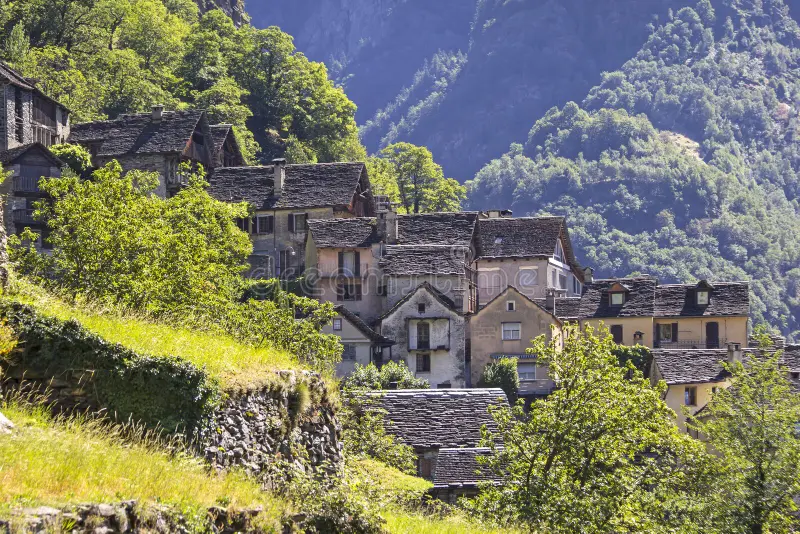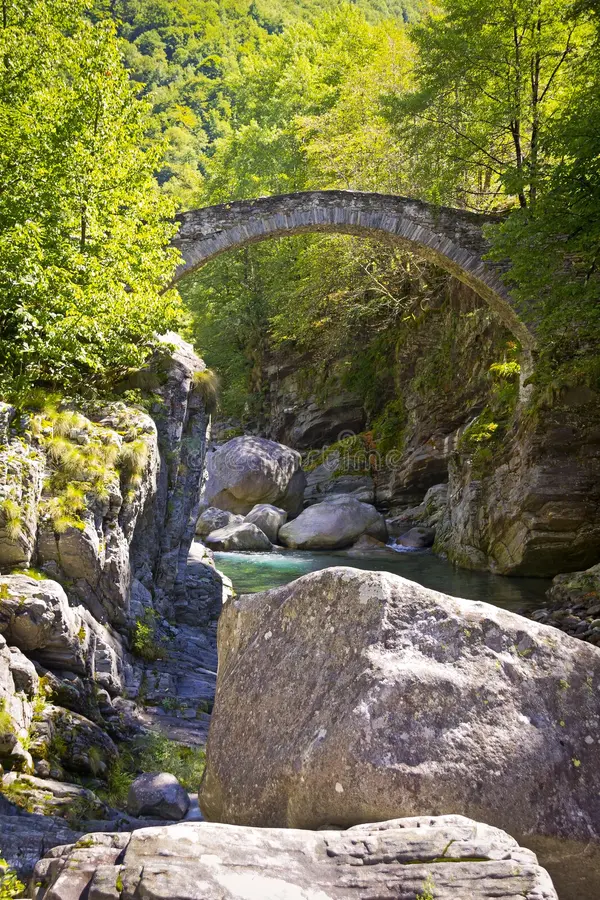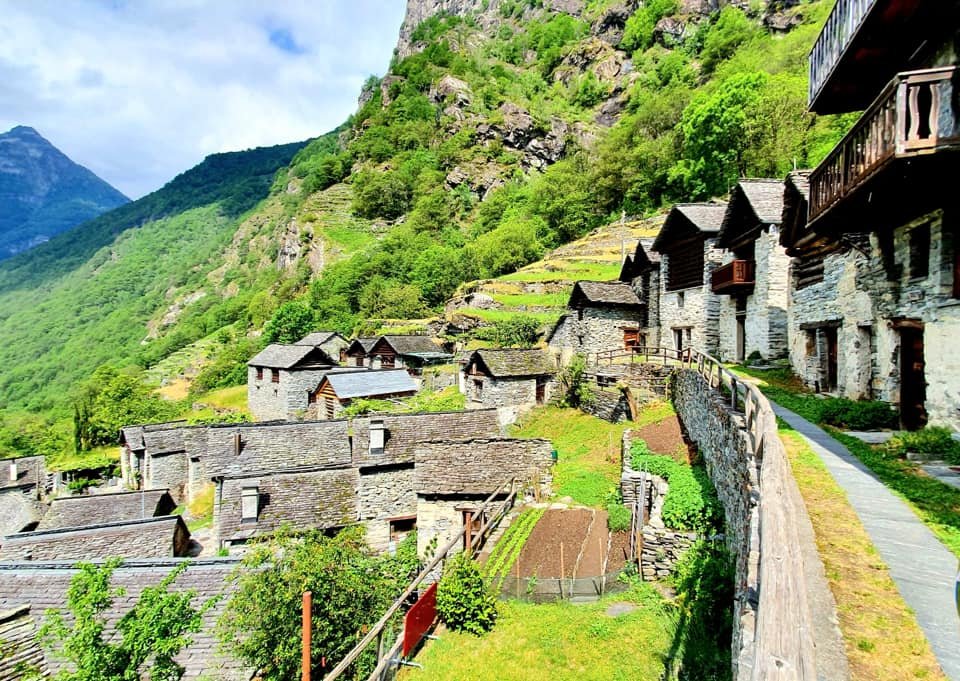Nestled on a sun-drenched rocky terrace at 716 meters above sea level, Brontallo is the first village of the Val Lavizzara, a sub-valley of Vallemaggia in Switzerland’s Ticino canton. With origins dating back to at least 1364, Brontallo’s medieval stone-slate houses appear to cling to the steep mountainside in a series of cascading steps. This tight-knit village—now home to fewer than 100 residents—has preserved its architectural heritage and rustic charm despite the gradual decline in population over the past few centurie
A Glimpse into Brontallo’s History
Brontallo was first mentioned in historical records in 1364 under the name “Bruntalo.” During the late Middle Ages and early Renaissance, it shared administrative and religious ties with neighboring hamlets such as Menzonio, Bignasco, and Cavergno, forming a Vicinanza (a cooperative community arrangement) in the region. The local church, dedicated to Santa Maria e San Giorgio, dates back to the 15th century. It was rebuilt in the 16th century and underwent several renovations thereafter. Until 1655, Brontallo belonged to the parish of Cevio before gaining its own ecclesiastical independence.

In 2004, Brontallo ceased to be an independent municipality when it merged with Broglio, Fusio, Menzonio, Peccia, and Prato?Sornico to form the larger municipality of Lavizzara. While modern conveniences now reach the village—most notably a road completed in 1955 connecting Brontallo to Bignasco and the wider Maggia Valley—it has managed to retain much of its medieval character.
Architecture & Landscape
What immediately captivates visitors is the village’s unique architectural ensemble. Stone houses with heavy slate roofs are arranged in “steps,” following the natural contour of the slope. On the western edge, a series of stables and barns form a continuous row facing the valley, creating a remarkable and nearly uninterrupted architectural façade. The village’s 17th-century church sits at the northern limit, its simple, whitewashed exterior providing a stark yet elegant contrast to the gray stone of the surrounding houses.
Surrounding Brontallo, lush chestnut forests and terraced vineyards cling to precipitous slopes. One notable vineyard, “I Mund,” sits at about 700 meters above sea level, making it one of the highest?elevation vineyards in Ticino. Thanks to the favorable south-facing exposure and the thermal properties of the rocky escarpments, vines flourish here despite the altitude.
Culture, Community & Economy
Most of the village’s roughly 90 inhabitants (as of 2020) communicate in Italian, reflecting Ticino’s cultural ties to northern Italy. Traditional livelihoods included agriculture, livestock rearing, and forestry. By the late 20th century, however, fewer than a third of residents were employed in farming, and many homes—once family-owned—were converted into vacation residences. Today, a blend of agrotourism and artisanal crafts supplements the local economy. Residents often open their farm-style ovens (the communal municipal oven) to bake bread during village celebrations, while chestnuts harvested from nearby forests are integral to local cuisine and autumn festivals.
The sense of community in Brontallo is palpable. Annual events—such as the feast day for San Giorgio, celebrated with a simple mass followed by a communal meal—allow visitors to experience authentic valley traditions. Handicrafts, from woodcarving to homemade preserves, are sold at the tiny local shop, reinforcing a deep connection between the villagers and their land.
Things to See & Do

- Church of Santa Maria e San Giorgio: Admire the 15th-century frescoes and the modest bell tower. The church’s location at the northern edge of the village affords panoramic views across the Val Lavizzara.
- Municipal Oven: A restored communal oven once used for village-wide bread baking. Today, it occasionally comes to life during special events and allows visitors to taste freshly baked local bread.
- Terraced Vineyards & Chestnut Forest: Hike up narrow paths to “I Mund” vineyard, one of the highest?elevation vineyards in the region (ca. 700 m). Further trails lead into dense chestnut groves, where seasonal chestnut-picking and rustic picnics are popular.
- Historic Stables & Barns: Stroll along the western slope of the village to see rows of stables—identical in design—facing the valley. This alignment of agricultural buildings is unique in Vallemaggia.
- Val Lavizzara Hiking Trails: From Brontallo, marked trails ascend toward Pizzo di Brünesc (2,355 m) and higher alpine meadows. These paths offer dramatic mountain vistas and encounters with rare Alpine flora.
Getting There & Accommodation
Brontallo lies approximately 30 kilometers north of Locarno. From Locarno or Ascona, travelers can drive (or take public buses) to Bignasco and then ascend the winding road to Brontallo. Since its completion in 1955, this road has opened the valley to tourism while preserving Brontallo’s secluded feel.
Accommodation options are limited to a handful of family-run guesthouses and mountain huts (often accessible only on foot). It is wise to book well in advance, especially during the peak summer months. For a truly immersive stay, consider one of the renovated stone houses available as vacation rentals, where you can experience village life firsthand.
Best Time to Visit
Summer (June–September) is ideal for hiking, vineyard tours, and enjoying the chestnut groves. With Ticino being Switzerland’s sunniest region, warm days and balmy evenings are common. In the fall, the valley’s chestnut harvest and grape vintage bring festive energy to the village, while crisp mountain air signals the approach of winter. Those seeking a tranquil winter escape can visit in December–March to witness snow-blanketed rooftops and serene, off-season charm—keeping in mind that some trails may be inaccessible due to snow.
From its medieval stone-slate architecture to its terraced vineyards and panoramic mountain views, Brontallo offers an authentic slice of Ticinese heritage. Whether you’re a hiker, history enthusiast, or simply seeking a retreat from modern life, this cliff-hanging village in Val Lavizzara promises a magical experience that feels, in many ways, frozen in time.





